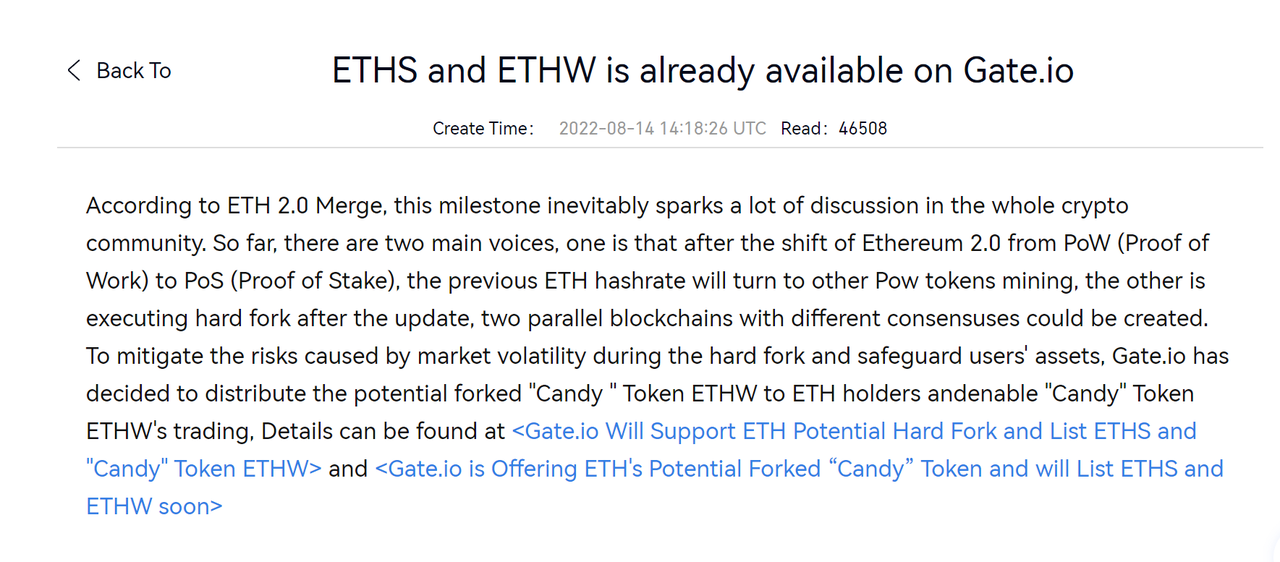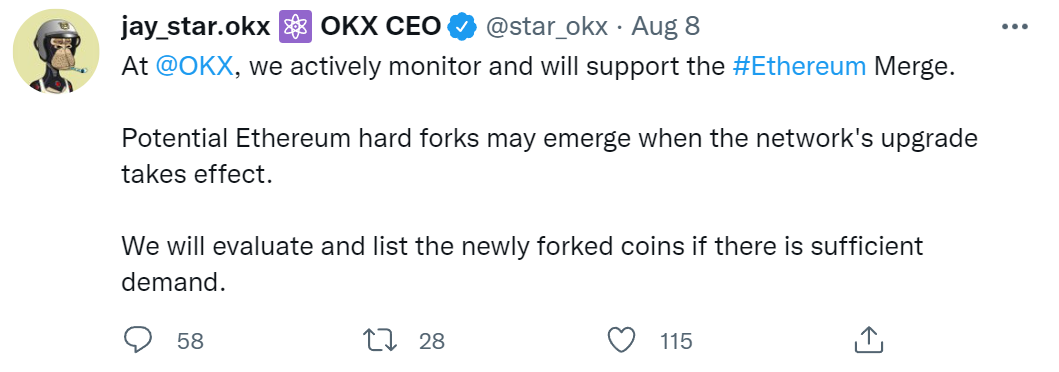What Should We Know About the Ethereum Hard Fork?
As the Merger of Ethereum draws closer, more people put their eyes on the Fork of Ethereum. In the blockchain world, cryptocurrency forks are actually very rare events, and when they happen, they generally have a big impact. Ethereum is the most important blockchain network today, so its fork is attracting unprecedented attention from the globe. But then again, fork is a rare phenomenon, and many people haven't fully understood it or what it means to us. In this article, we'll explain in detail what the fork is, what the Ethereum fork is like, and what we should do about it.
What is the fork of cryptocurrency
Simply put, a fork refers to a change or upgrade of the blockchain protocol. When we use a traditional, non-distributed network, the change of a certain content is often very simple. For example, when a software is upgraded, as long as a new version is pushed to users and the old version is gradually closed, all users can be guaranteed to use the latest version. But in a distributed network, because the network is not uniformly controlled, when changes occur, it is likely that some people will use the new protocol and others will use the old protocol. If everything goes smoothly, the new protocol will become mainstream, thus scrapping the old protocol, but in extreme cases, the coexistence of the two protocols will also occur, and two different chains will be generated.
If some forks do not change anything about the actual structure of the protocol, but are maintenance work, then we call them "soft forks", and their existence is actually tolerable. But the opposite "hard forks" are very different. They are huge changes to the cryptocurrency protocol itself that invalidate the old version. If the old version continues to exist, it will be separated from the new version. Generally speaking, a functioning cryptocurrency does not implement a hard fork.
Ethereum Fork
In the upcoming Ethereum Merge, Ethereum will transition from a PoW consensus mechanism to a PoS consensus mechanism, which is undoubtedly a hard fork and even fundamentally changes the way Ethereum operates. Speaking of which, I'd like to talk about the hard forks that occurred in Ethereum in the past. Since its inception in 2015, Ethereum has undergone several hard forks, the most controversial of which is Ethereum Classic (ETC).
In 2016, the Ethereum development team noticed a vulnerability in the DAO (Decentralized Autonomous Organization) contract that resulted in the theft of about 3.6 million ETH. Based on the way the contract was designed, the funds experienced a 28-day freeze before being transferred. In this case, Ethereum implemented a hard fork, in which the development team fought back against the hackers and recovered the funds.
But the hard fork also divided the Ethereum community into two camps. Those in the first camp are happy with the actions taken by the development team. They believe it means developers have learned their lesson and can handle it properly if something like this happens again.
The second camp disagrees with the Ethereum fork, arguing that for the cryptocurrency to be truly decentralized, the development team has to go with the flow. Once the development team starts taking action, it will set off a chain reaction and jeopardize the future of cryptocurrency.
Eventually, the developers decided to implement a hard fork, and the old blockchain was called Ethereum Classic. This fork also led to the separation of two currencies: ETH and ETC.
It can be seen that under the current trend of Ethereum's transition to PoS, there will also be supporters and opponents of PoS, which foreshadows the emergence of new chains and ETHPoW tokens when merging.
Opinions of authoritative experts and institutions
Faced with the possibility of generating a new Ethereum chain, industry insiders have different opinions. Vitalik, the main developer of Ethereum, raised objections to the ETHPoW fork. He believes that the supporters of the fork just want to make quick money. In fact, Ethereum already has a PoW fork chain, which is the aforementioned ETC. Vitalik believes that if you are willing to use PoW, it is a wiser choice to directly switch to ETC.
The project side represented by Frax Finance also expressed its opposition to the fork. Frax is the fifth largest stablecoin in the world and a key part of the Ethereum ecosystem. Its founder Sam Kazemian initiated a proposal in the community, calling on the Frax DAO to choose ETHPoS as the only Frax recognized Ethereum network.
Image excerpt from Frax Finance proposal
The opposite fork supporters mostly come from exchanges. Gate.io has launched the ETH exchange function on August 14. Users can exchange ETH for ETHW or ETHS, where ETHW represents the possible PoW chain tokens.

Image from Gate.io official announcement
OKX CEO Jay Hao also said that OKX supports Ethernet merger, but in the event of a hard fork, OKX will list hard fork tokens according to feature review.

How we understand the fork
Frankly speaking, the attitudes of the above parties all depend on their interests in the forked chain. The head project party does not need to take risks on the forked chain, so they tend to support the PoS chain; and the exchange can use the resources of the forked chain itself to attract numerous users and funds, so it naturally becomes the supporter of the PoW chain.
As users, we should remain calm at this time to prevent being carried away by various remarks and making unnecessary investments. At the same time, such a node also means opportunities. You can pay attention to the airdrop of some forked coins, and there may be unexpected gains.
If you are interested in exploring in the cryptocurrency field, you are also welcome to Kele Pool. We are an infrastructure platform integrating PoW mining and PoS staking, dedicated to providing safe and reliable cryptocurrency services.
Secure: The staking smart contract of Kele Pool has passed the audit of SlowMist Technology, the blockchain authority. And Kele Pool supports the use of Ledger hardware wallet.
Flexible earning of cryptocurrency: Unlike most mining pools that only have a single service, Kele Pool supports two service modes, and you can freely choose the method that meets your needs. Compared with other mining pools, the service fee is also more reasonable.
Official website: https://www.kelepool.com/
